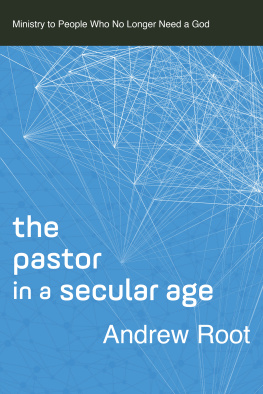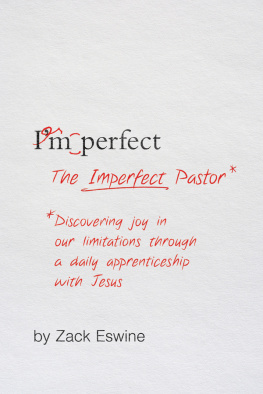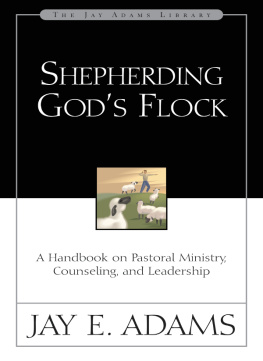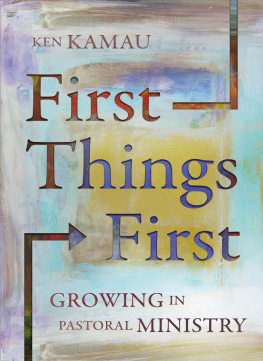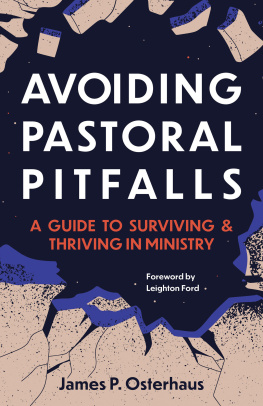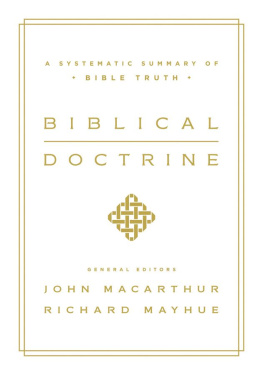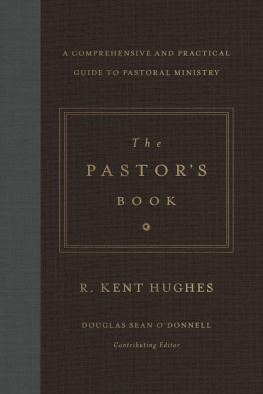THE
VULNERABLE
PASTOR
How Human Limitations
Empower Our Ministry
MANDY SMITH
Foreword by DAVID HANSEN
InterVarsity Press
P.O. Box 1400,
Downers Grove, IL 60515-1426
ivpress.com
2015 by Mandy Smith
All rights reserved. No part of this book may be reproduced in any form without written permission from InterVarsity Press.
InterVarsity Pressis the book-publishing division of InterVarsity Christian Fellowship/USA, a movement of students and faculty active on campus at hundreds of universities, colleges and schools of nursing in the United States of America, and a member movement of the International Fellowship of Evangelical Students. For information about local and regional activities, visit intervarsity.org .
All Scripture quotations, unless otherwise indicated, are taken from THE HOLY BIBLE, NEW INTERNATIONAL VERSION, NIVCopyright 1973, 1978, 1984, 2011 by Biblica, Inc.Used by permission. All rights reserved worldwide.
While any stories in this book are true, some names and identifying information may have been changed to protect the privacy of individuals.
Cover design: Cindy Kiple
Images: Desert landscape: Mark Newman/Getty Images
Abstract background: Vectorig/iStockphoto
ISBN 978-0-8308-9887-9 (digital)
ISBN 978-0-8308-4123-3 (print)
Library of Congress Cataloging-in-Publication Data
Smith, Mandy, 1971
The vulnerable pastor : how human limitations empower our ministry / Mandy Smith ; foreword by David Hansen.
1 online resource.
Includes bibliographical references.
Description based on print version record and CIP data provided by publisher; resource not viewed.
ISBN 978-0-8308-9887-9 (eBook) -- ISBN 978-0-8308-4123-3 (pbk. : alk. paper)
1. Clergy--Psychology. 2. Clergy--Mental health. 3. Vulnerability (Personality trait) 4. Pastoral theology. I. Title.
BV4398
253.2--dc23
2015029419
For the good people of University Christian Church.
You have restored my hope in what the church can be.
The joke of it is that often it is the preacher who as steward of the wildest mystery of them all is the one who hangs back, prudent, cautious, hopelessly mature and wise to the last when no less than Saint Paul tells him to be a fool for Christs sake, no less than Christ tells him to be a child for his own and the kingdoms sake.
Frederick Buechner
Contents
Foreword
by David Hansen
T he landscape is littered with pastors who feel inadequate. I count myself as one of them. According to Mandy Smith, we are on the brink of an infusion of power if we embrace our weaknesses and count them as gifts from God. In the process we trust the one God to make up the difference between who we feel we are and what our ministry can become. At least we have the apostle Paul on our side, as he tells the church in Corinth, Not that we are competent in ourselves to claim anything for ourselves, but our competence comes from God (2 Corinthians 3:5).
Part of the problem is the tonnage of literature, seminars, lectures and conferences on ministry where leaders call us to pick up their methodologies and follow them. Of course theres nothing wrong with a little rah-rah, common sense and good ideas once in a while, but much of it calls us in the end to raw Promethianism as we allow ourselves to become dominated by a cult of personality and go forth to do the same. We go back home, try things out and they dont work. We feel worse about ourselves than before we startedand, tragically, worse than we really are!
Into this environment Mandy paints a wholly other paradigm. Here is a thoroughgoing exploration of the concept of vulnerability in ministry as strength, as a place to give God the primary place in the equation of ministerial competency. If youre wondering if her vision of ministry grows a church, it just might: her church is growing. I dont mind saying that, not to set up an expectation for your ministry, but to overturn the idea from the start that the picture she paints hereand, by the way, she is a painter, as well as a ridiculously good writeris a justification for oblivion. This is very real for me, since I pastor an old church of about sixty in a high-crime area of Cincinnati. For us vulnerability isnt an excuse to die. For us vulnerability is a strength as we care for our members and our neighborhood, not knowing what our institutional future may bring.
But its not just about work in the inner city or the dead spots in rural areas. Her method (or shall I say, unmethod) works in all sorts of ministry environments. The potential is wide; it works with big-church all-togethers who long for a place to be fully human, post-Christian wanderers who cant relate to highfalutin answers, pastors on the brink of burnout and those already over the cliff who are looking for a way to envision ministry again.
It works because Mandys explication of vulnerability lived out is first and foremost a modus operandi of the Spirit. As such it is demanding. Giving in to the Spirit requires a ruthless release of the self-generating self. If this all sounds like biblical leadership, it should. It is the presupposition of Mary giving her body and soul to the Spirit and Moses leading Israel out of Egypt. As much as these are different tasks and different personalities, they are one strategy: utter reliance on God.
Introduction
God Is an Odd Leader
Since being a pastor was impossible, I decided to do that. I prayed: Lord, being a pastor is impossible, so if you will be with me all the way to help me, I will be a pastor.
David Hansen, The Art of Pastoring
O ur work as pastors is impossible. This is a fact many of us dont learn until were well into it. In the beginning we see some intelligence, charm or talent in ourselves that makes us think were up for the challenge of ministry, but inevitably we find its not enough. We always will if were doing this work right, for we have been given an impossible task as imperfect beings representing a perfect God. Eventually we find that we have been called to something far beyond us. At some point we will be faced with a sadness too great for our hearts to carry, a question too heavy for our minds, a responsibility that crushes us. When we get there, what will we do? Walk away from a cruel God who would hand us an impossibility? Internalize it as our own failing? Blame everyone around us?
Maybe theres another way. Maybe God gave us an impossible task for a greater purpose.
When we as leaders have an important message or a huge task, we pull out all the stopslights, music, production. But over and over, when God has some serious business to take care of, he goes small and obscure. Throughout Scripture, when its time to cast a vision or start a movement, he begins with a child, a pauper or a stranger. He seems to see some kind of renewable resource in human emptiness, a power source in human weakness. Which leads him to make the very odd choice to call us to ministry.
If Gods effort to engage with humans were only about communicating ideas, he could do just fine without us. His linguistic skill outstrips anything we bring. But he sees potential in us to express his deepest heart. To tell his story, God often begins with human limitationa blank canvas where he can begin creating.



